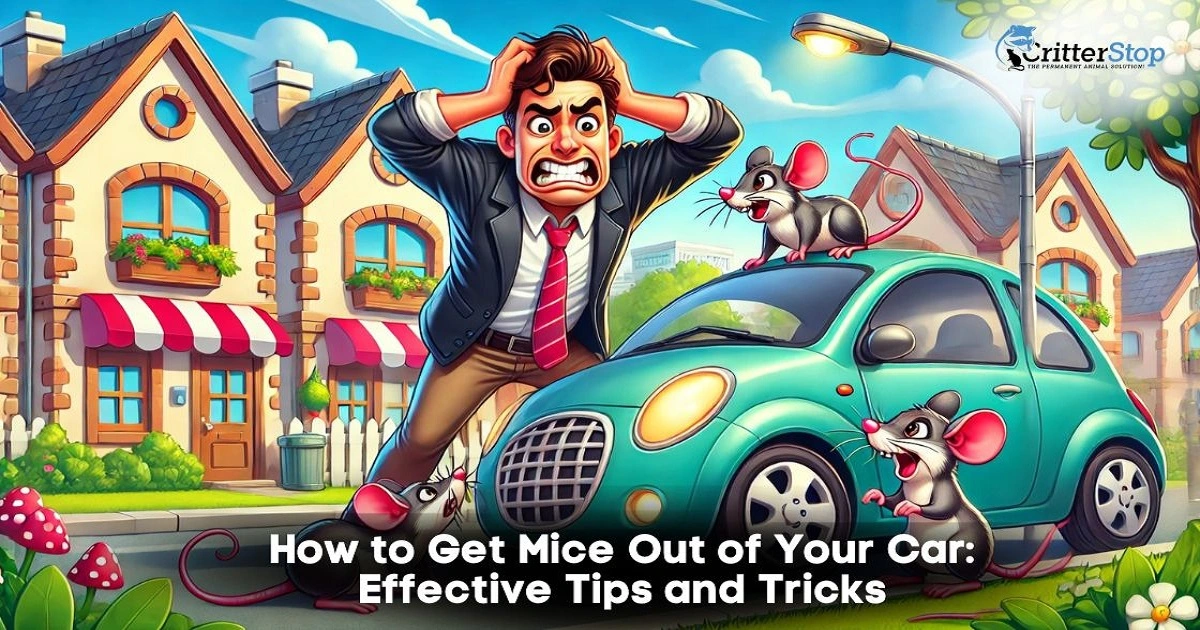
Mice can be a nuisance in any environment, and cars are no exception. If you've discovered that mice seek shelter in your car, it's important to act fast to prevent further damage and potential health hazards. In this article, we'll explore some effective methods for getting mice out of your car and keeping them from returning.
Identifying their origin is one of the first steps in getting mice out of your car. Mice are small and can squeeze through tiny openings, so inspecting your vehicle thoroughly is crucial. Check for any holes or gaps in the car's exterior and openings around the doors, windows, and vents. Once you identify the entry points, you can seal them off and prevent further access.
Another key step in getting mice out of your car is removing any food or nesting materials that may attract them. This includes crumbs, wrappers, and any other debris that may be present in the car. Removing any nesting materials, such as shredded paper or fabric, that the mice may have brought in is also essential. By eliminating these attractants, you'll make your car a less appealing place for mice to live.

If you have ever had mice in your car, you know how frustrating it can be to eliminate them. Mice can damage your car's interior and chew through wires, causing costly repairs. This section will discuss why mice enter cars and the common signs of mice in your vehicle.
Mice enter cars for a variety of reasons. One of the most common reasons is to seek shelter. Cars attract mice because they provide a warm, dry environment perfect for nesting. Mice can also get in cars searching for food. If you leave food in your vehicle, mice will be attracted and may decide to make your car their home.
If you suspect you have mice in your car, there are several common signs to look for. One of the most obvious signs is droppings. Mice leave behind small, dark droppings typically found in the glove box, under the seats, or in the trunk. Another sign of mice in your car is gnaw marks. Mice chew through anything they can find, including wires, upholstery, and plastic. You may also notice a foul odor in your car, caused by the mice's urine and droppings.
You must take action fast to get mice out of your car. Traps and repellents can be effective, but prevention is the best approach. Keep your vehicle clean and food-free, and seal any entry points that mice may use to get inside. These tips can help you keep your car mouse-free and avoid costly repairs.
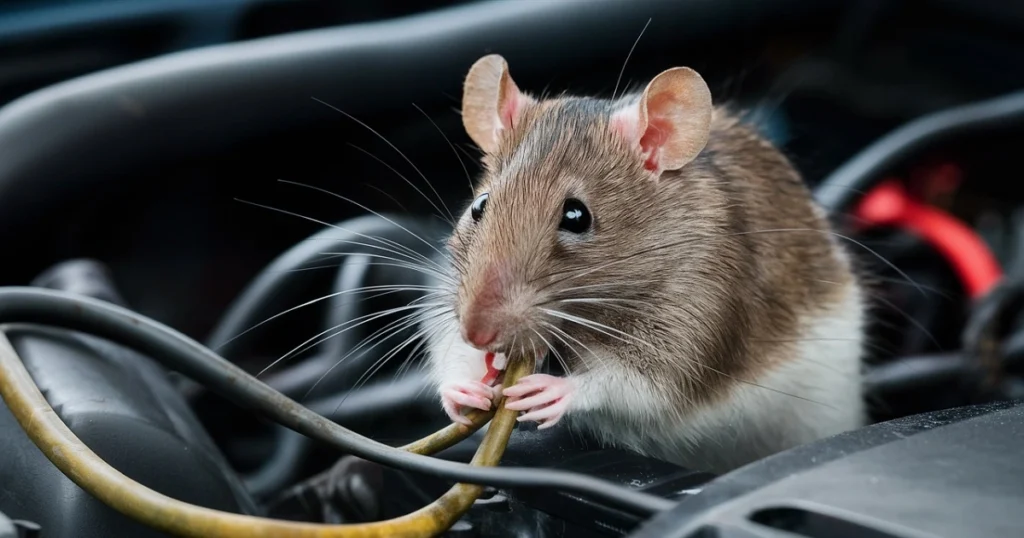
If you suspect your car has mice, it's important to act quickly and implement some form of rodent control to prevent further damage. Here are several measures to get mice out of your car.
The first step is to inspect your car thoroughly to determine the extent of the infestation. Look for signs of mice, such as droppings, urine stains, chewed wires, or upholstery. Pay particular attention to the engine compartment, as mice often seek warmth and shelter there.
Once you have identified the affected areas, remove any debris or clutter that may provide hiding places for the mice. This can include items such as food wrappers, old newspapers, and cardboard boxes.
If you have identified a mouse in your car, there are several manual removal techniques that you can use to get rid of it. One option is to use a live trap to capture the mouse without harming it. Simply bait the trap with a small amount of food, like peanut butter or bits of cheese, and place it where you have seen mouse activity.
Another option is to use a snap trap, which instantly kills the mouse. These traps are more effective than live traps but can be more difficult to set up and dispose of.
If you prefer not to use traps, you can use natural repellents like peppermint oil or mothballs. These substances have a strong odor that mice find unpleasant, which may be enough to drive the mice out of your car.
To prevent future infestations, keeping your car clean and clutter-free is essential. Avoid leaving food or trash in the car, and consider using a mouse repellent spray or electronic deterrent device. Additionally, sealing any gaps or holes in the car's exterior can help prevent mice from entering in the first place.
These immediate measures can effectively get mice out of your car and prevent further damage.
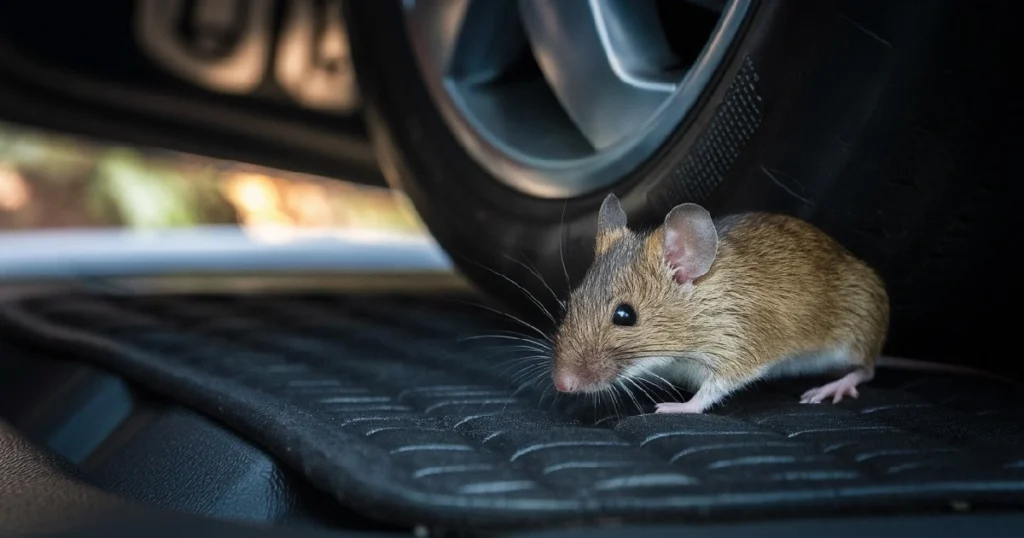
Once the mice have been successfully removed from the car, it is important to thoroughly clean and disinfect the interior to prevent the spread of harmful bacteria or diseases. Start by removing any debris, such as nesting materials or droppings, with a vacuum cleaner. Wear appropriate gear, such as gloves and a mask, to protect yourself from health hazards.
Next, disinfectant spray sanitizes all surfaces, including the dashboard, seats, and floor mats. Pay close attention to areas where the mice were frequently present, such as the glove compartment or under the seats. Allow the disinfectant to sit briefly before wiping it away with a clean cloth.
Consider using a specialized car upholstery cleaner or odor eliminator for tough stains or odors. Follow the manufacturer's instructions and test the product on a small area to ensure it doesn’t damage the material.
Even after the mice have been removed and the car has been thoroughly cleaned, a lingering odor is common. To combat this, a few steps can be taken.
First, place an open container of activated charcoal or baking soda in the car overnight. These natural odor absorbers can help to neutralize any remaining smells.
If the odor still lingers, use an ozone generator. This device produces ozone, which reacts with and neutralizes any odor-causing molecules in the air. However, ozone can harm humans and pets, so follow the manufacturer's instructions carefully and use the generator in a well-ventilated area.
In conclusion, cleaning and sanitizing after a mouse infestation in a car is essential for maintaining a safe and healthy environment. By following these steps and using the appropriate products, any remaining odors can be eliminated, and future infestations can be prevented.
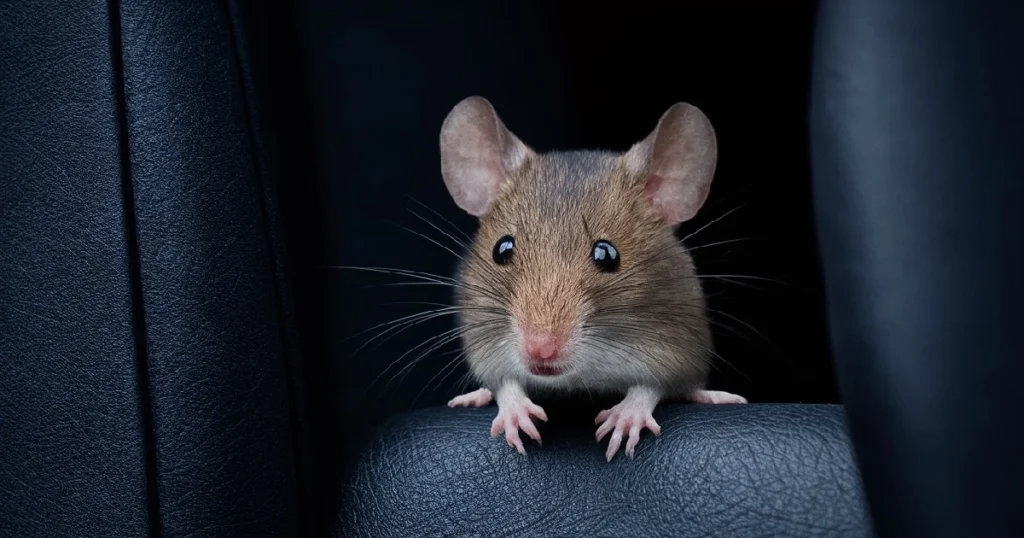
One of the most effective ways to prevent mice from entering your car is to secure all entry points. This includes gaps or holes in the car's bodywork and openings around windows or doors. You can use steel wool or wire mesh materials to block any potential entry points. It's important to note that mice can fit through even the smallest gaps, so thoroughly inspect your car and seal any potential entry points.
In addition to securing entry points, several natural deterrents can help keep mice away from your car. One popular option is to use dryer sheets, which have a strong odor mice find unpleasant. Simply place several dryer sheets in your car, focusing on areas where mice are likely to enter, such as the engine compartment or interior. Another option is peppermint oil, which has a strong odor that mice dislike. Soak cotton balls with peppermint oil and place them in your car.
While natural deterrents can be effective, they may not work for everyone. If you live in an area with a large mouse population or if your car has a history of mouse infestations, you may need to take additional measures to keep mice out of your car.
Following these preventive strategies can significantly reduce the risk of mice entering your car. However, if you find mice in your car, take action to prevent more damage. Consider using the best mice repellent for cars, or consult a professional pest control service for more specialized assistance.
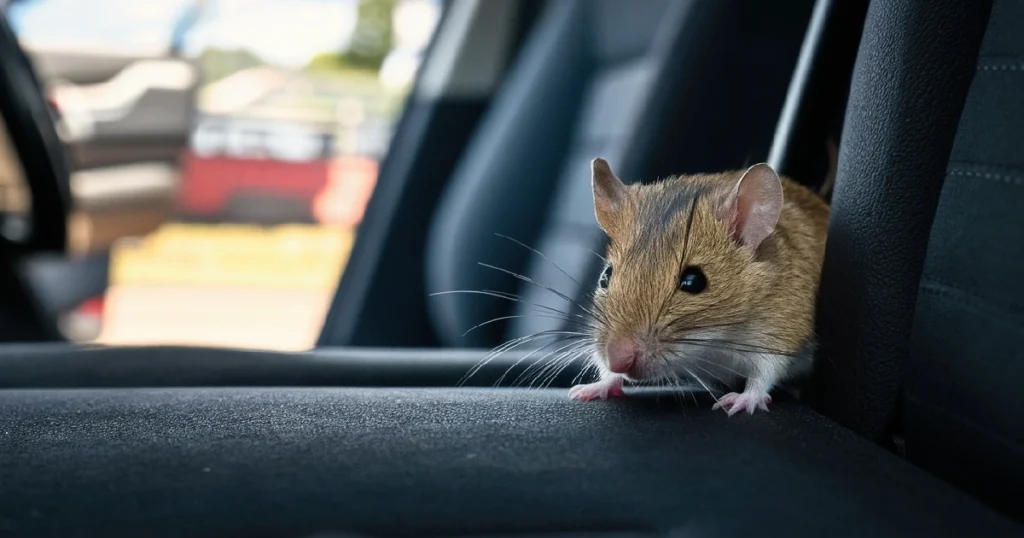
Ultrasonic repellents weaponize high-frequency sound waves to repel mice. These devices are available in various shapes and sizes and can be plugged into the car's cigarette lighter or powered by batteries. While ultrasonic repellents are marketed as an effective way to eliminate mice, little scientific evidence supports their efficacy. Some users report success with these devices, while others claim they are a waste of money.
Chemical repellents are another option for keeping mice out of their cars. These repellents come in sprays, granules, or pouches containing essential oils or other natural ingredients that mice find unpleasant. Some of the best mice repellents for cars include peppermint oil, mothballs, and fabric softener sheets. However, it is essential to remember that these repellents may work in the short term, but they are not a long-term solution and must be reapplied frequently.
Consider your situation's specific needs when choosing a commercial repellent or device. If you’re hunting for the best mice repellent for RVs or mobile homes, you may want to consider a larger device or a more potent chemical repellent. Remember to follow the instructions and use the product as directed to ensure the best results.
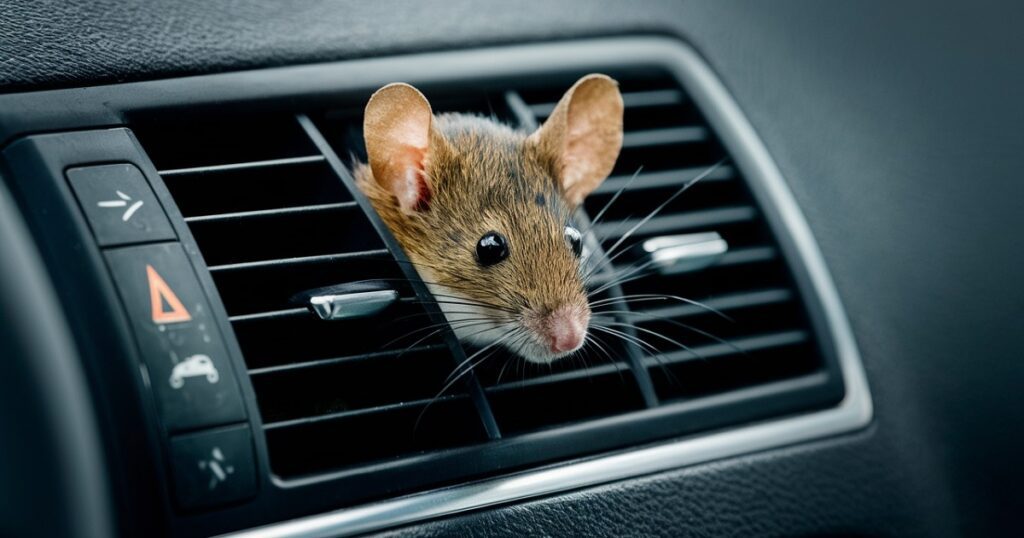
If you suspect mice in your car vents, the first step is to clean them out. This can be done using a vacuum cleaner or compressed air. Wearing gloves and a mask while cleaning is essential so you can avoid inhaling dust or debris.
Start by removing the vent covers and cleaning them thoroughly. Use a brush or cloth get rid of debris or buildup. Next, use a vacuum cleaner or compressed air to clean the vents. Ensure to get into all the nooks and crannies to remove nesting materials or droppings.
After cleaning, it is vital to disinfect the vents to kill bacteria or viruses that are left behind by the mice. Disinfectant spray or wipe to thoroughly clean the vents and vent covers.
If cleaning the vents does not solve the problem, a professional ventilation system inspection may be necessary. A professional can check for any damage or blockages allowing mice to enter.
During the inspection, the professional may use a camera to better look at the inside of the ventilation system. They may also use traps or baits to catch any mice hiding inside.
Once any issues have been identified, the professional can make the necessary repairs or replacements to prevent mice from entering the ventilation system.
Remember, addressing mice in car vents can help prevent damage to your car and avoid potential health hazards. Following these steps can help you address mice in your car's ventilation system and keep your car running smoothly.
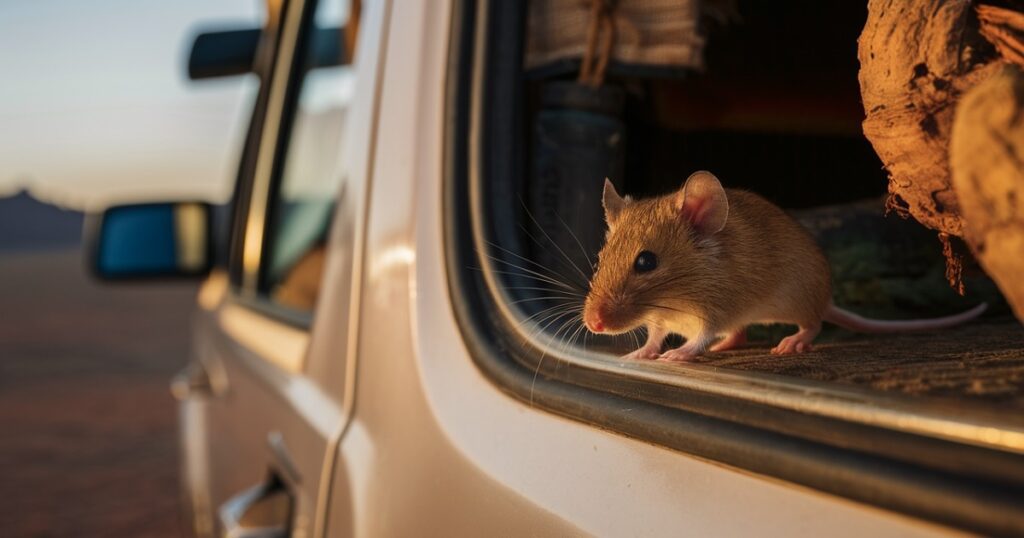
Mice infestations are not limited to houses and apartments. Mobile and trailer homes are also susceptible to these pesky rodents. If you have a mobile or trailer home and are dealing with a mouse infestation, here are some tips to help you eliminate them.
Mobile and trailer homes have small spaces that mice can easily enter. Seal any cracks or holes in the walls, floors, and ceilings using caulk or expanding foam to keep them out. Pay attention to pipe and wire foundations in the home.
Another way to protect your home from mice is to install door sweeps and weather stripping. These will prevent mice from entering through gaps around doors and windows. Keep your home clean and clutter-free, as mice are attracted to food and nesting materials.
To get rid of mice long-term, you need to eliminate their food and water sources. Store all food in tight containers while keeping a clean kitchen. Fix leaks or drips to prevent mice from accessing water.
Traps and baits can also be effective in getting rid of mice. Snap and glue traps are commonly used, but humane traps are also available. Baits can be placed where mice are likely to travel, such as along walls and under furniture.
If you are storing your mobile or trailer home over the winter, take steps to keep mice out. Seal any openings in the exterior of the home and use mouse repellents, like peppermint oil or dryer sheets, to keep them at bay.
Following these tips can help you successfully get rid of mice in your mobile or trailer home. Remember, preventative measures keep mice from returning.
If DIY methods have failed to get rid of mice in your car, consider calling a professional pest control service. A professional exterminator can provide effective solutions to eliminate mice from your car while preventing them from returning.
It is advisable to call an exterminator if you have tried the DIY methods but the infestation persists. Additionally, if you have a severe infestation or are dealing with mice in your mobile home, trailer home, or RV, it is best to seek professional help.
Professional pest control companies like Critter Stop provide various services to eliminate mice from your car. They use humane and eco-friendly methods to remove mice and prevent them from returning.
When you call Critter Stop at (214) 234-2616 for a free inspection, they will assess the extent of the infestation and recommend the best course of action. They will also provide you with a quote for the services required.
Critter Stop has a fantastic reputation and online customer reviews because it provides high-quality work and great customer service. They use safe and effective methods to eliminate mice from your car and prevent them from returning.
In conclusion, if the DIY methods have failed, it is best to call in a professional pest control service like Critter Stop to remove mice from your car. They provide effective solutions to eliminate mice and prevent them from returning, ensuring a pest-free environment.
As the temperatures drop, mice will start seeking shelter in warm places, including your car. It is essential to take a few preventative measures to prevent mice from residing in your vehicle during the winter.
Firstly, seal any gaps or holes in your car's exterior that could be used as entry points for mice. This includes gaps around doors, windows, and other openings. You can use a sealant or weatherstripping to close these gaps.
Secondly, remove any debris from your car's engine compartment. Mice are fond of nesting in warm, cluttered areas, so a clean engine compartment is less attractive.
Finally, consider using a mouse repellent, such as peppermint oil or dryer sheets, to deter mice from entering your car. These natural repellents can be placed inside the car or under the hood.
In the summer months, mice are less likely to seek shelter in your car, but it is still crucial to take preventative measures to keep them out.
One key step is to keep your car clean and free of clutter. Mice are attracted to food and nesting materials, so removing any debris from your car's interior can help prevent infestations.
Another tip is to park your car in a well-lit area, as mice prefer dark and quiet spaces.
Finally, if you suspect mice has taken up residence in your car, use a mouse trap or bait station. These can effectively capture or kill mice before they damage your vehicle.
Following these seasonal considerations can help prevent mice from entering and damaging your car. Remember to take proactive steps to keep your car clean and well-maintained and to use natural repellents or traps if necessary.
When dealing with mouse infestations in vehicles, humane removal practices are crucial. This means avoiding poisons or other harmful methods that could cause unnecessary suffering to the animals. Instead, use live traps to capture the mice and release them back into the wild.
It is important to note that relocating mice to a new area may not be the most effective solution, as they may simply return to your vehicle or cause problems elsewhere. Therefore, it is recommended that you release them at least 5 miles away from your current location.
When dealing with mice infestations in vehicles, it is important to comply with all relevant regulations and laws. This includes ensuring that any removal methods are legal and you are not in violation of any animal cruelty laws.
Additionally, some states may have specific regulations regarding using certain types of traps or the relocation of animals. Therefore, it is vital to research and comply with these regulations before attempting to remove mice from your vehicle.
It is also essential to consider the potential impact on other wildlife in the area. For example, using poisons to kill mice could also harm other animals that may come into contact with the poison.
When dealing with mice infestations in vehicles, it is crucial to approach the situation carefully and consider both the animals and the environment.
You are not alone if you have a mouse infestation in your car. Many car owners have had to deal with this problem, which can be frustrating and time-consuming. In this section, we will address some of the most frequently asked questions about how to get mice out of your car and keep them from coming back.
The first step in getting mice out of your car is to remove any food sources and nesting materials that may attract them. This includes cleaning your car thoroughly, removing debris, and vacuuming crumbs or other food particles. You can also set traps or use repellents to help eliminate mice already in your car.
Mice are more likely to seek shelter in cars during winter, so taking steps to prevent them from getting in is important. This includes sealing up gaps or holes in your car's exterior, keeping your car clean and free of debris, and using repellents or traps to deter mice from entering.
If you want to get rid of mice in your car quickly and without needing professional help, you can try a few things. These include setting traps, using repellents, and sealing gaps or holes in your car's exterior to prevent mice from getting in.
While some people swear by using dryer sheets to keep mice out of their cars, no scientific evidence supports this claim. However, dryer sheets' scent may help deter mice from entering your car.
Several home remedies may effectively remove mice from your car, including setting traps, using peppermint oil or other natural repellents, and sealing up any gaps or holes in its exterior.
There are several types of mice repellents that may be effective for use in an RV, including electronic repellents, natural repellents like peppermint oil, and ultrasonic devices.
Mice can remain inside a vehicle while in motion, but this is not common. Most mice will try to escape as soon as they sense movement.
To keep mice out of a trailer house, it is important to seal up any gaps or holes in the exterior, keep the area clean and free of debris, and use repellents or traps to deter mice from entering.
Several scents, including peppermint oil, mothballs, and dryer sheets, may help deter mice from entering automobiles.
Mice are likely to hide in various places within a car, including the engine compartment, the trunk, and the interior. They may also nest in the upholstery or chew on wires and other components.
While some believe dryer sheets can help prevent mice from entering cars, no scientific evidence supports this claim. However, the dryer sheets' scent may help deter mice.
To eliminate mice from your car's dashboard and vents, you may need to thoroughly remove and clean the affected components. You can also use traps or repellents to help remove any remaining mice.
Visit our Critter Library and learn more about our furry friends







